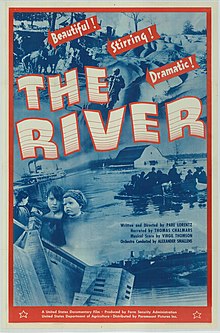The River (1938 film)
| The River | |
|---|---|
 | |
| Directed by | Pare Lorentz |
| Written by | Pare Lorentz |
| Cinematography | Floyd Crosby Willard Van Dyke Stacy Woodard |
| Distributed by | Farm Security Administration |
Release date |
|
Running time | 31 minutes |
| Country | United States |
| Language | English |
The River is a 1938 short documentary film which shows the importance of the Mississippi River to the United States, and how farming and timber practices had caused topsoil to be swept down the river and into the Gulf of Mexico, leading to catastrophic floods and impoverishing farmers. It ends by briefly describing how the Tennessee Valley Authority project was beginning to reverse these problems.
It was written and directed by Pare Lorentz and, like Lorentz's earlier 1936 documentary The Plow That Broke the Plains, was selected for preservation in the United States National Film Registry by the Library of Congress as being "culturally, historically, or aesthetically significant", going into the registry in 1990.[1][2] The film won the "best documentary" category at the 1938 Venice International Film Festival.
Both films have notable scores by Virgil Thomson that are still heard as concert suites, featuring an adaptation of the hymn "How Firm a Foundation". The film was narrated by the American baritone Thomas Hardie Chalmers. Thomson's score was heavily adapted from his own concert work Symphony on a Hymn Tune.[3] The River later served as the score for the 1983 TV movie The Day After.[4]
The two films were sponsored by the U.S. government and specifically the Resettlement Administration (RA) to raise awareness about the New Deal. The RA was folded into the Farm Security Administration in 1937, so The River was officially an FSA production.
There is also a companion book, The River.[5] The text was nominated for the Pulitzer Prize in poetry in that year.
See also
[edit]Notes
[edit]- ^ "Complete National Film Registry Listing". Library of Congress. Retrieved 2020-05-08.
- ^ Gamarekian, Barbara; Times, Special To the New York (1990-10-19). "Library of Congress Adds 25 Titles to National Film Registry". The New York Times. ISSN 0362-4331. Retrieved 2020-08-06.
- ^ Ledin, Marina; Ledin, Victor (2000). THOMSON, V.: Symphonies Nos. 2 and 3 / Symphony on a Hymn Tune (CD liner note) (Media notes). Naxos Records.
- ^ Stuever, Hank (May 11, 2016). "'Convincing catastrophe': What The Post's TV critic wrote about 'The Day After' in 1983". The Washington Post. Retrieved September 13, 2017.
- ^ Lorentz, Pare (1938). The River. New York: Stackpole Sons. no page numbers, text and photo stills, mostly from the film
External links
[edit]- The River essay [1] by Dr. Robert J. Snyder at National Film Registry
- The River at IMDb
- The short film The River (part 1) is available for free viewing and download at the Internet Archive. (part 2) (missing part 3)
- Pare Lorentz
- The River
- The River review
- The River's channel on YouTube posted by the FDR Presidential Library and Pare Lorentz center
- The River on YouTube, a better copy, posted by PublicResourceOrg
- The River essay by Daniel Eagan in America's Film Legacy: The Authoritative Guide to the Landmark Movies in the National Film Registry, A&C Black, 2010 ISBN 0826429777, pages 266-268 [2]
- 1938 films
- United States National Film Registry films
- American black-and-white films
- 1930s short documentary films
- Films directed by Pare Lorentz
- Documentary films about agriculture in the United States
- Documentary films about disasters
- American short documentary films
- Black-and-white documentary films
- Works about the Dust Bowl
- 1938 documentary films
- 1930s American films
- Environmental documentary film stubs
